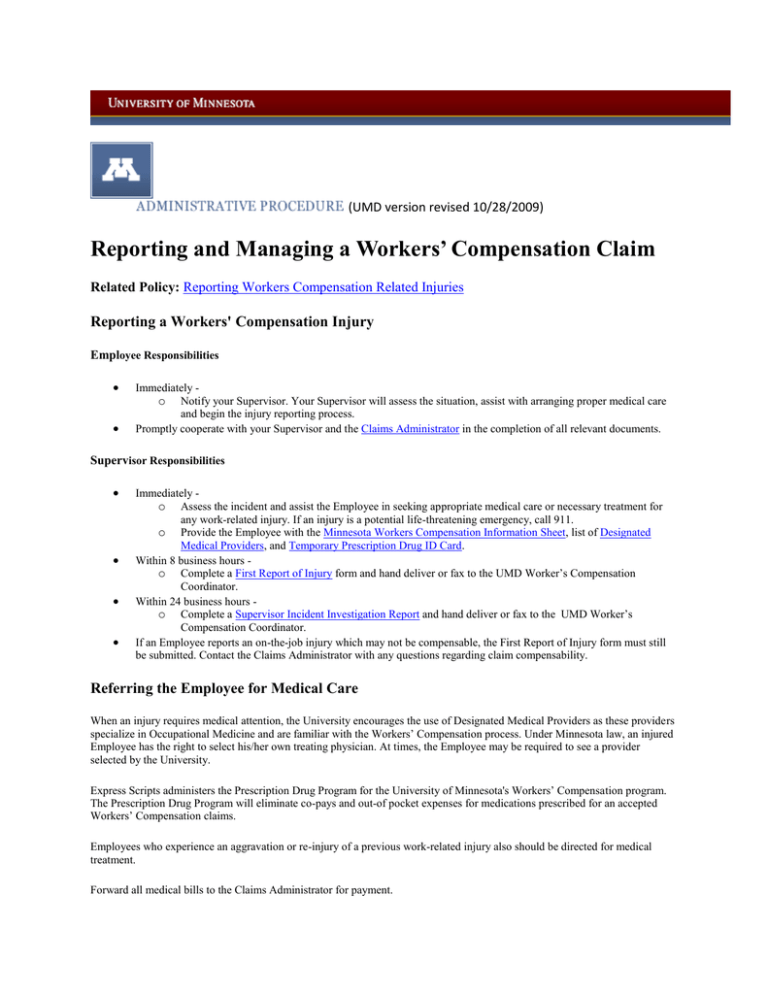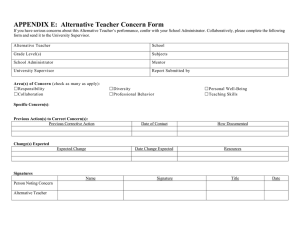
(UMD version revised 10/28/2009)
Reporting and Managing a Workers’ Compensation Claim
Related Policy: Reporting Workers Compensation Related Injuries
Reporting a Workers' Compensation Injury
Employee Responsibilities
Immediately o Notify your Supervisor. Your Supervisor will assess the situation, assist with arranging proper medical care
and begin the injury reporting process.
Promptly cooperate with your Supervisor and the Claims Administrator in the completion of all relevant documents.
Supervisor Responsibilities
Immediately o Assess the incident and assist the Employee in seeking appropriate medical care or necessary treatment for
any work-related injury. If an injury is a potential life-threatening emergency, call 911.
o Provide the Employee with the Minnesota Workers Compensation Information Sheet, list of Designated
Medical Providers, and Temporary Prescription Drug ID Card.
Within 8 business hours o Complete a First Report of Injury form and hand deliver or fax to the UMD Worker’s Compensation
Coordinator.
Within 24 business hours o Complete a Supervisor Incident Investigation Report and hand deliver or fax to the UMD Worker’s
Compensation Coordinator.
If an Employee reports an on-the-job injury which may not be compensable, the First Report of Injury form must still
be submitted. Contact the Claims Administrator with any questions regarding claim compensability.
Referring the Employee for Medical Care
When an injury requires medical attention, the University encourages the use of Designated Medical Providers as these providers
specialize in Occupational Medicine and are familiar with the Workers’ Compensation process. Under Minnesota law, an injured
Employee has the right to select his/her own treating physician. At times, the Employee may be required to see a provider
selected by the University.
Express Scripts administers the Prescription Drug Program for the University of Minnesota's Workers’ Compensation program.
The Prescription Drug Program will eliminate co-pays and out-of pocket expenses for medications prescribed for an accepted
Workers’ Compensation claims.
Employees who experience an aggravation or re-injury of a previous work-related injury also should be directed for medical
treatment.
Forward all medical bills to the Claims Administrator for payment.
Returning the Employee to Work
The Medical Provider must complete a Report of Workability (1) and provide it to the Employee and the UMD Worker’s
Compensation Coordinator. The Report of Workability will indicate when the Employee can return to work and whether job
modifications are required to accommodate physical restrictions. The Employee will provide a copy of the Report of Workability
to the UMD Worker’s Compensation Coordinator, who will update the Supervisor with the employee’s work status.
Employees without restrictions can return to their usual work duties.
If the Medical Provider imposes work restrictions, the Supervisor and Claims Administrator will review the job
modifications that are required to comply with the restrictions. Every effort will be made to accommodate the
employee's restrictions. If work is available within the restrictions, the Employee will return to suitably modified work.
The Supervisor will monitor the Employee's recovery on a weekly basis and report the Employee's recovery progress to
the Claims Administrator. It is also recommended that employee and/or department work with the Coordinator of the
UMD UReturn Program.
UMD Director, UReturn - Employee Services
278 Darland Administration Building
1049 University Drive
Duluth, Minnesota 55812-3011
218-726-7725
Fax 218-726-8083
Contact:
UMD Workers’ Compensation Coordinator
255 Darland Administration Building
Telephone: 218-726-6827
FAX: 218-726-7505
(1)Medical Providers will have their own version of the Report of Workability.
© 2009 Regents of the University of Minnesota. All rights reserved.
The University of Minnesota is an equal opportunity educator and employer.
Last modified on August 3, 2009; UMD Version Modified: 10/28/2009


